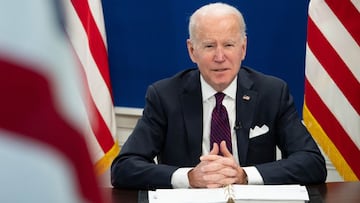Is the Biden administration forgiving student loans? Are student loans on pause?
One year into the Biden presidency and there has been no word on student debt cancellation. Biden has extended the student debt moratorium to help assist borrowers.


On the campaign trail, then candidate Biden said that he would use executive action to forgive up to $10,000 in student debt. After being elected, movement on this issue has been basically non-existent.
After a lawsuit between thirty-nine states and Navient, the student loan services, led to a historic settlement of $1.85 billion, the calls for Biden to use his executive powers to forgive student loans has increased.
Additionally, we should forgive a minimum of $10,000/person of federal student loans, as proposed by Senator Warren and colleagues. Young people and other student debt holders bore the brunt of the last crisis. It shouldn't happen again.
— Joe Biden (@JoeBiden) March 22, 2020
During the Campaign -- May
In May 2020, Biden said that the government "should forgive a minimum of $10,000/person of federal student loans, as proposed by Senator Warren and colleagues. Young people and other student debt holders bore the brunt of the last crisis. It shouldn't happen again."
October 2020
Later in 2020, candidate-Biden affirmed this position again at a town hall in Miami with college students saying "I’m going to eliminate your student debt if you come from a family [making less] than $125,000 and went to a public university.” Continuing the Biden said,“I’m going to make sure everyone gets $10,000 knocked off of their student debt."
November 2020
When he became President he said that he would look into working with Democrats to propose a debt cancellation bill, angling that he would not be using executive authority.
February 2021
At a CNN town hall, Biden says that he is still interested in student debt cancellation but does think he has the authority to do so . To look into the matter, he tasked the Department of Education to draft a memo to better understand what his authority as President grants him in relation to student debt cancellation. This report has not yet been released, and almost a year later, many are wondering when it can be expected.
December 2021
In answering questions from the media, Press Secretary Jen Psaki said the President would be happy to sign a bill if Congress chose to pass one that called for student debt cancellation.
However, what advocates of cancellation argue is that it is within the powers of the President and given that ten Republicans would have to vote to approve the measure, passing a bill seems highly unlikely.
January 2021
This week, President Biden held a press conference where he was asked "You campaigned on canceling $10,000 in student loans. Do you still plan to do so, and when?" The journalists followed up with another question related to election counting. The President completely ignored the first question, so the question remains open.
When does the student loan moratorium expire?
In December, the Biden administration extended the student loan moratorium to 1 May after the Omicron variant began to disrupt life in the US. When making the announcement on 22 December, the administration said the decision as made to give the Department of Education more time "to ensure they have the support they need to transition smoothly back into repayment and advance economic stability for their own households and for our nation."
The comments also make it seem that the prospects of massive debt cancellation are unlikely in that the statement as it asks "all student loan borrowers to do their part as well," by taking "full advantage of the Department of Education’s resources to help you prepare for payments to resume."
What impact does the moratorium have?
The moratorium ensures that student loan borrowers are not penalized while they aren't making payments. No interest is applied to the principle, so basically a borrower can pick up their payments where they left off.
Baby boomers are by far the generation most opposed to student loan forgiveness: 45% said no debt should be forgiven at all. https://t.co/i36JNY5fyj pic.twitter.com/Vr7QadlAQN
— Morning Consult (@MorningConsult) December 22, 2021
Where does public support stand on the issue of loan forgiveness?
Related stories
In December, Morning Consult reported that 62 percent of surveyed voters support some form of loan forgiveness. About nineteen percent of respondents supported full cancellation, with around fifteen percent that full cancellation should only be granted to low income people.
By generation, Baby Boomers were the most likely to be opposed to cancellation or forgiveness, while younger generations viewed the policy proposal in a much more favorable light.

